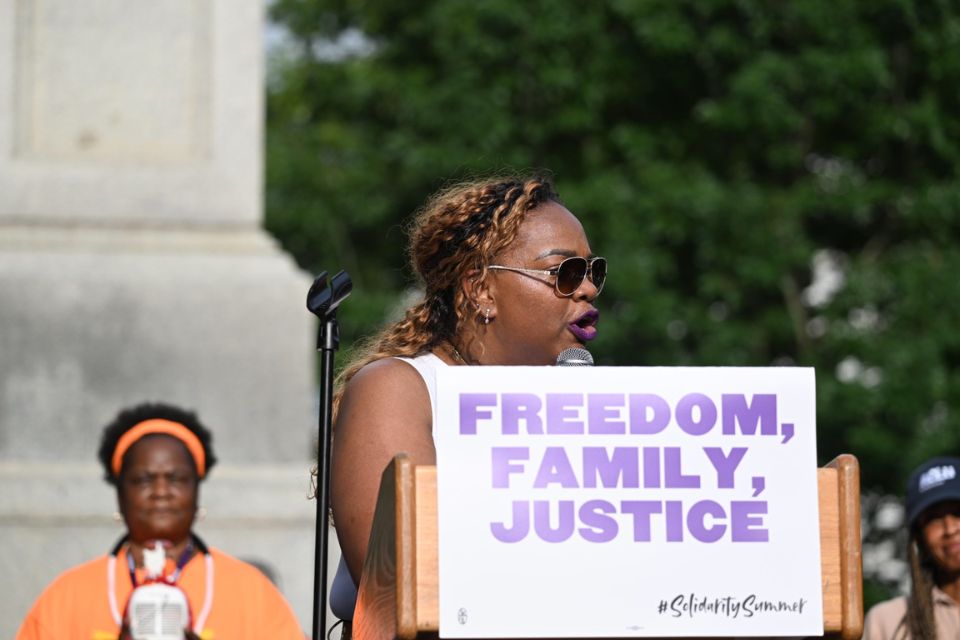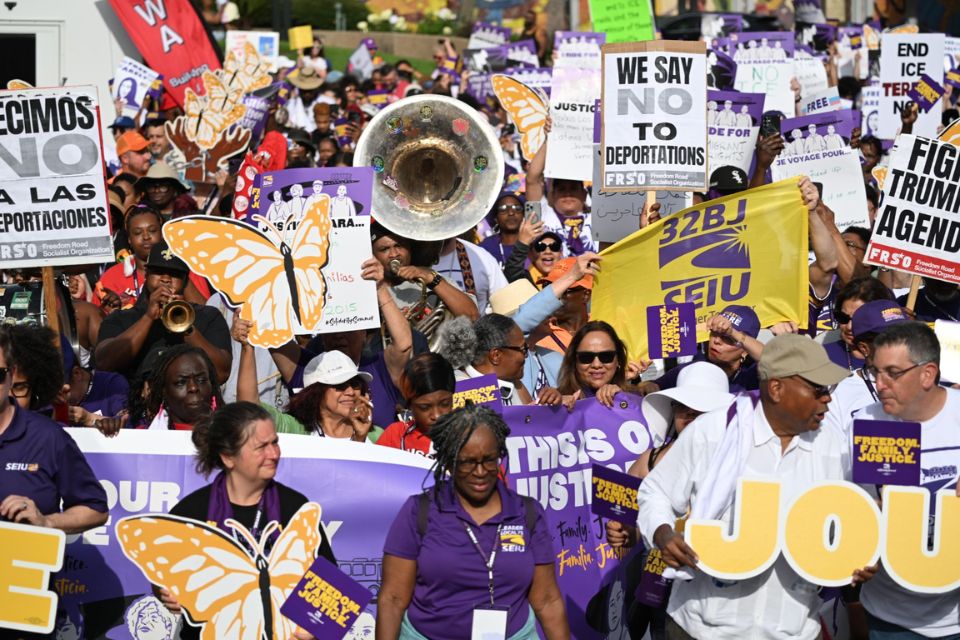Chicago union worker Tahiti Hamer joined SEIU’s Justice Journey from Chicago to Louisiana. Here she is at The National Civil Rights Museum, a stop along the tour (Photo Provided).
At the center of the Justice Journey Rally and Bus Tour is a message that’s both simple and urgent: Stand up for the voiceless.
For Tahiti Hamer—a union worker, mother, and descendant of civil rights icon Fannie Lou Hamer—that call runs deep.
She traveled from Chicago to Louisiana with a group of organizers, care workers, and allies, bearing witness to the treatment of immigrants in detention and the fear that follows them. For Hamer, this wasn’t just a protest. It was a mission.
The journey—called the Justice Journey—brought together service and care workers with the Service Employees International Union (SEIU), along with faith leaders and community allies. They traveled from Chicago through the Southwest and into Louisiana, demanding “Freedom. Family. Justice.” in the face of growing attacks on immigrant communities and the constitutional rights they’re entitled to—freedom of speech, freedom to assemble, and due process.
A Journey Rooted in History
“The primary goal was to learn about our nation’s past and the history of working class people standing up to protect oppressed communities,” Hamer said.
One stop stood out—the Lorraine Motel in Memphis, where Dr. King was assassinated.
“It was so heartfelt and so liberating,” she said. “It inspired me to do more… to help those who feel that they don’t have a voice.”
That energy carried the group from Chicago—a city with its own legacy of migration and resistance—down through the South and into the shadows of ICE detention centers in Louisiana.
ICE Raids in North Lawndale
This wasn’t abstract for Hamer. She’s seen it with her own eyes.
“In North Lawndale,” she recalled, “I watched [ICE agents] break out a window to an apartment. These men were dressed in army gear with ATF guns. Who does this to an individual who is defenseless?”
She described how ICE officers disguised themselves as delivery workers to force their way into homes. One moment from March stays with her: “They yelled ICE, and the man took off running,” she said. “He should have never had to run for his life.”
The fear spread to her own workplace. Two immigrant coworkers had their hours cut for safety. “They don’t leave the same way they come in. We would buy food for them because they were scared to go to the stores.”
A Message to the Trump Administration

The Justice Journey theme: “Freedom. Family. Justice” (Photo Provided).
When asked what message the Justice Journey sends to Washington, Hamer didn’t hesitate.
“That they are not alone, and we’re gonna stand and we gonna fight and we’re gonna keep fighting until justice is served,” she said.
To Black Americans who feel that immigrant rights aren’t their fight, Hamer offered this:
“We’re immigrants as well. We came over here… on a boat,” she said. “We were treated the same way as they are. Did we like it? No. Put yourselves in their shoes.”
She added, “Trump and this administrative staff does not care about the working class people. If you’re not a billionaire… you don’t exist, to him.”
A Detention Center With No Windows
In Jena, Louisiana, Hamer visited the Central Louisiana ICE Processing Center. The memory still stings.
“There were no windows,” she said. “That means there’s no sunshine coming through there. There’s not a bit of hope shining through there.”
She wondered aloud whether the detainees could hear the rally outside. “I hope they can feel us in spirit,” she said. “Because we are here and we’re not going anywhere.”
After the Journey, the Work Continues
Hamer plans to return home with more than memories.
“This is something I’m going to go back and share with the people who I work with… with my community… with the families that we provide services for,” she said.
She’s done it before. Hamer, who was displaced by the Obama Presidential Center’s development in South Shore, has already been featured in Time Magazine.
“I tell people, I am a teacher,” she said. “Kids don’t see color, they see kids. Ignorance and racism is taught. But if we can change the way these kids view and see things, we can make it a lot better.”
Carrying the Hamer Name
Fannie Lou Hamer’s fight lives on in her descendant.
“She is a cousin. She married into the family,” Tahiti said. “And I hope I do her justice in the work I’m trying to do now with my generation and the generation coming behind me.”
A Warning, and a Call

Service and care workers with the Service Employees International Union (SEIU), along with allies and faith leaders, embarked on a Justice Journey (Photo Provided).
The scenes Hamer witnessed in North Lawndale and across the South weren’t someone else’s problem.
“This can be any of us,” she said. “What if that was your grandmother? Your daughter? Your son?”
“Every life deserves to be lived… not tortured, not beaten, not starved, not held captive.”
And to those who doubt their own power?
“It’s more of us than it is them,” she said. “Don’t y’all know the power that y’all hold? We have it. We just gotta use it.”


